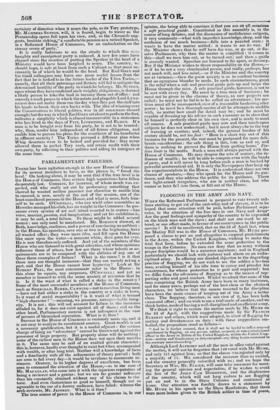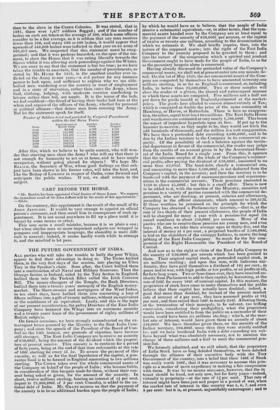FLOGGING IN THE ARMY AND NAVY.
WHEN the Reformed Parliament is prepared to vote twenty mil- lions sterling to get rid of the cart-whip and of slavery, it is to be hoped that some attention will be paid, before Parliament sepa- rates, to the situation of the free men in our Navy and Army- Are the good feelings and sympathy of the country to be expended on the black man and the slave ; and shall not one word be ut- tered, or one effort made, in favour of our countrymen in the public service ? It will be recollected, that on the 2d of April last, when the Mutiny Bill was in the House of Commons, Mr. HUME pro- posed a clause to put an end altogether to corporal punishments in the Army, within the United Kingdom, wishing to make the trial first here, before he extended the same protection to the troops in the Colonies. No man can deny that an army without proper discipline would be a nuisance anywhere; and in England particularly we should look with jealousy and alarm on an undis- ciplined army. In offering our decided objection to the degrading practice of flogging, we do not wish to see the soldier a lawless man, availing himself of his idle time to annoy and plunder his countrymen, for whose protection he is paid and supported : but we differ from the advocates of flogging as to the means of sup- porting order and good conduct. Whilst we admit that some of the men comprising the British Army have been in many instances, and for many years, perhaps not of the best class or the choicest characters, we believe that the means resorted to for discipline have been the main causes of keeping out of the Army a better class. The flogging, therefore, in our view of it, has been both cause and effect ; and we wish to see a trial made of another, and we think better, mode of having a well-disciplined and an efficient army: We think it right to restate the motion made by Mr. HUME on the 2d of April, with the suggestions made by Sir FRANCIS BURDETT and others, which were adopted, to allow of flogging for mutiny and drunkenness on duty : with these suggestions em- bodied, the proposition stood as follows- " And be it further enacted, that it shall not he lawful to inflict corporal punishment by flogging, on any private soldier, corporal, or non-commissioned
officer in the Army or 1Lhua of the United Kingdom, within the United King- dom—mutiny and drunkenness on duty excepted—any thing herein contained to the contrary notwithstanding."
. Although Lord ALTH ORP and all the men in office voted against the motion, it will not be forgotten that 140 voted with Mr. HUME, and only 151 against him; so that the clause was rejected only by a majority of 11. We considered the measure then as carried, and the country generally coincided with us ; and we hope the Secretary at War, Mr. ELLICE, will soon take measures for meet- ing the general opinion and expectation, if he wishes to avoid the fate of Sir JOHN CAM HOBHOUSE, and the displeasure of the country, which will not long endure to see flogging put an end to in the Slave Colonies and continued at home. Our attention was forcibly drawn to a statement by Mr. HUME in his speech oa the Slave Resolutions, that there were more lashes given to the British soldier in time of peace, than to the slave in the Crown Colonies. It was stated, that in 1831, there were. 1,477 soldiers flogged; and if the number of lashes on each are taken at the average of 300, which some officers consider to be a fair average, as it is seldom that any man receives fewer than 200, and many 500 or 600 lashes, it would appear that upwards of 440,000 lashes were inflicted in that year on an army of 103,413 men. We suspected that this statement must be exag- gerated; and that it was perhaps hazarded, on the spur of the mo- ment, to show the House that it was acting liberally towards the Slaves whilst it was allowing such proceedings against the Whites. We are sorry to say that the statement is but too true; as we have taken the trouble to ascertain, that the number of pUnishments, as stated by Mr. HUME for 1831, is the smallest number ever in- flicted on the Army in one year,—a sod picture for any humane person to look upon, and sufficient to explain why we see able- bodied men wandering over the country in want of employment and in a state of starvation, rather than enter the Army, where food, clothing, lodging, with moderate exercise amounting to leisure rather than toil, are ample. It is the terror of the lash, we feel confident—the dread of having their backs laid bare at the whim and caprice of the officers of the Army, whether for personal or political offences—that deters men from entering the Army.- But let the statement speak for itself. •
Number of Soldiers tried and punished by Corporal Punishment within the last Seven Years.
F.stablislunent of Number Number
Yam.. British Army. Tried. Flogged.
1805 98,946 4.708 1.737 1896 111.053 5,594 9,040 1807 5.340 2,291 1828 111.107
19(1)30:974178 2.143
1829 5.314 4,782 1.743 1830 103,374 . 5,747 1,662 1831 103,413 7,370
1,477
After this, which we believe to be quite correct, who will won- der that starving men shun the Army ? who will say that there is not enough for humanity to act on at home, and to have ample occupation, without going abroad for objects ? We hope Mr. ELLICE, the Secretary of War, whose good feelings on that sub- ject have been shown in his former votes, will take the hint, and, like the Bishop of LONDON in respect of Oaths, come forward and anticipate the public wishes. If not, we shall return to the subject.



















 Previous page
Previous page